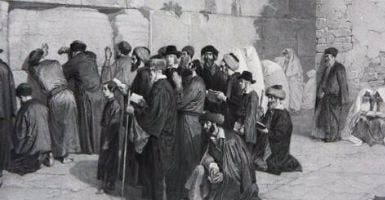It is well known that Pikuach Nefesh overrides all Torah prohibitions, excluding the three cardinal sins (Aveiros Chamuros): idolatry, adultery, and murder. When faced with any of these three sins, one must “forfeit his life rather than transgress” (“Yehareg v’Al Ya’avor”). However, there can be cases when the conflict is with a prohibition that is related to one of these three Aveiros but is not the actual sin.[1] What is the law regarding these situations? Does Pikuach Nefesh override these also? This topic is dealt with extensively by the Poskim but we will focus on one source in Maseches Sanhedrin (75a) from which the Poskim derive many important laws. The Gemara relates the following famous incident:
Rav Yehuda said in the name of Rav: It happened that a certain person stared at a woman and became ill from his passion for her. They came and asked the doctors who said that his only remedy is to have relations with her. The Chachamim said: He must forfeit his life rather than have relations with her. [They asked:] May she stand naked before him? [The Chachamim answered:] He must forfeit his life rather than have her stand naked before him. May she converse with him from behind a curtain? He must die rather than talk to her from behind a curtain.
Rabbi Yaakov bar Idi and Rabbi Shmuel bar Nachmani argued. One said: She was a married woman. The other said: She was unmarried. This makes sense according to the one who says she was married, but according to the one who says she was unmarried what is the reason for all of this? Rav Pappa said: It is due to the insult to the [woman’s] family that would have resulted. Rav Acha the son of Rav Ika said: In order that the Jewish women not be promiscuous. [If she was unmarried] why did he not marry her? His mind would not have settled, as Rabbi Yitzchak said: From the day the Beis Hamikdash was destroyed, the satisfaction of relations has been removed and given to those who transgress. As the Pasuk states: “Stolen waters are sweet and bread of secrecy is pleasant.”[2]
Though it is unclear what the exact medical emergency was, the Gemara indicates that it was certainly a case of Pikuach Nefesh. Nevertheless, the Chachamim forbade him to implement the doctors’ advice due to the reasons that we will explain below. We must first understand why the doctors changed their minds after each ruling of the Chachamim. They began with the advice that he must have relations with the woman, then they retracted and said that it is sufficient for her to stand before him. Ultimately, they withdrew to recommending a simple conversation between them where they would be separated and he would not be able to see her. The Chavos Yair[3] (182) explains that the doctors were indeed forced to retreat. They originally believed that only having relations would cure him, but after the Chachamim’sruling they suggested that perhaps a lesser action would suffice. On the other hand, the Aruch laNer[4] explains that the doctors gave completely false and dishonest advice; their remedies were not meant to help in the slightest. Their continued attempts to suggest illicit actions showed that their original assessment (“his only remedy is to have relations with her”) was false and that they were lying the entire time.
These explanations are significant in order to explain Chazal’s responses to forbid the man from following the doctor’s orders. As mentioned, he was certainly in a state of Pikuach Nefesh. All Aveiros in the Torah are overridden by Pikuach Nefesh except for the three cardinal sins, one of which is adultery. Thus we may understand the original ruling of the Chachamim to forbid intimate relations since he must forfeit his life in the face of such a sin. However, the following rulings of the Chachamim regarding actions that were not actual adultery seemingly relate to the Machlokes Rishonim about “subsidiaries of adultery”, i.e., matters that pertain to adultery but are not included in the actual prohibition. Do these also follow the rule of “Forfeit your life and do not transgress”?
The Baal haMaor (Sanhedrin 74b), Ramban (Toras haAdam, Inyan Sakana), Ran (Pesachim 25a, Yoma 82a), and Nimukei Yosef (Sanhedrin 74a) all hold that the law of forfeiting one’s life applies even to matters that are only related to the actual sin. This includes touching a person who is an Erva (forbidden relationship) or using an Asheira tree for healing purposes. These Rishonim adduce proof from our Sugya as the Chachamim forbade the man from healing himself via forbidden acts, not only the actual sin of relations but even Abizrayhu. They did so even though he would die as a result of the lack of “medical treatment”.
Tosfos (Pesachim 25a, Avoda Zara 27b), and Rosh (Avoda Zara 2, 9) make the following distinction. If the doctor tells the patient that only the Asheira tree has the mystical ability to heal him, he would be required to forfeit his life. But if the doctor simply instructs that wood be brought without specifying which type, then one may bring wood of a tree used for idol worship. The patient may be healed with this since it is not considered actual idol worship. What is the explanation of this Chiluk? The Minchas Chinuch (296) understands that Tosfos argue with the aforementioned Rishonim. Meaning that in Tosfos’ opinion, one is not required to forfeit his life for Abizrayhu of the three Aveiros Chamuros. Only when the intention of using the Asheira is to influence others and promote the “powers” of Avoda Zara must one must forfeit his life, which is not a factor when simply using the wood of such a tree for healing without regard for its source. The Minchas Chinuch notes that those who follow this approach must explain our Sugya differently.
Indeed, several explanations have been offered to reconcile the Sugya with the approach that Yehareg v’Al Ya’avor does not apply to Abizrayhu of the three Aveiros Chamuros.
The Radbaz was asked the following question (Responsa 4:2): Reuven and his wife were in hiding with no person to assist them. His wife fell ill while she was a Nida. Can her husband touch her, such as to assist her to lie down or arise and perform her needs? If he is a doctor, can he check her pulse? If he is a professional, can he let blood for her? Does it make a difference if she is endangered or not?
At the outset, he quotes the Terumas HaDeshen who distinguishes between a case where the husband is ill and one in which the Nida is ill. If the husband is ill, then there is no concern that he will sin due to his weakened state. But if the woman is ill, “he may not assist her for perhaps his Yetzer will overcome him and he will come to sin and she will not prevent him since she is weakened.” The Radbaz states: “In my humble opinion, this applies when he is the only one who [is available] to assist her [but he can hire others]. Then we would obligate him to hire a female attendant for her. But if he was ill we would not obligate her to hire an attendant for him. We may infer this from his words because he said: ‘If he is ill and he has nobody to tend to him’, he has nobody to tend to him but others (his wife) do”. He explains that the Terumas HaDeshen seems to have only forbidden the husband’s assistance in a case where he can hire someone else and he infers this from the wording of the question posed to the Terumas HaDeshen. But where there is no alternative option and his inability to assist her will certainly lead to [worsening of her condition and] her death: “Should he leave her to die? This is not ‘the way of peace’”.
Thus, in a case where there is no choice and the woman’s life is dependent upon her husband’s care, he is permitted to tend to her. The Radbaz questions this assumption from our Sugya from which it seems that even for Abizrayhu of adultery one must forfeit his life. The Radbaz answers:
This is not a question at all. In that case, the illness came from the Aveira, hence he must die rather than speak to her from behind the curtain. But in this case, the illness did not come from an Aveira. I even hold this is permitted in a case of illness that is not life-threatening since the only option is [for the husband to attend to her] because the remedy is not dependent on committing a transgression and, for several reasons, it is a far-fetched concern that he will have relations with her. Firstly, since she is so ill that she requires another person to assist her in lying down and arising, nobody desires her, for one does not desire a dead person. Also, since she is ill and weak she will not allow him [to lie with her] and we are not concerned that he will rape her. Furthermore, even non-Jews distance a Nida; certainly holy Jews [will do the same], especially with a dead or ill person. Moreover, this is not the way of peace. For although she may not be in danger now, it is a distinct possibility that she will [progress to] a state of dangerous illness because there is nobody to lay her down and help her rise.
The relevant point is the fundamental distinction that he presents: There is a difference if the illness arose from an Aveira and the Yetzer or if it arose from a natural cause. In the former case, he is forbidden from participating even in Abizrayhu of adultery, even if he will die as a result. In the latter case, if the only remedy is through actions that are Abizrayhu of a cardinal sin, we permit the Aveira in a situation of Pikuach Nefesh.
Accordingly, we may reconcile the Sugya in Sanhedrin with the Rishonim that hold that a person should not be Moser Nefesh for Abizrayhu of the three Aveiros Chamuros. Both the Chavos Yair and Aruch laNer resolve their respective approaches to the Gemara in Sanhedrin with the opinion of these Rishonim.
Reviewing their approaches to the Sugya, the Chavos Yair understood that the doctors truly believed that their first instruction would definitely cure the man. After the Chachamim prohibited intimate relations between them, they presented second and third suggestions that might have worked, although not with certainty.[5] The Aruch laNer explained that the doctors lied and their falsehood was exposed by their changing advice.
- The Chavos Yair explains that the law of “transgress and do not forfeit your life” applies only when it is certain that the person will be healed. If, however, this is not a certainty then one must forfeit his life even for Abizrayhu.
- The Aruch laNer explains that once the doctors were exposed as liars the Chachamim realized that the man would not necessarily die without their prescribed remedies. Originally, the doctors said that he will die if he does not have relations with the woman, and then they said that he only needs to see or talk to her in order to recover. If so, this does not constitute a situation of Pikuach Nefesh and, thus, Abizrayhu are not overridden whatsoever.
[1] This is referred to as “Abizrayhu”.
[2] Mishlei 9:17
[3] R’ Yair Chaim Bachrach (c. 1639-1702), Rav of Mainz (Magenza) and Worms, author of Shu”t Chavos Yair, Shu”t Chut haShani, and Mekor Chaim on Shulchan Aruch.
[4] R’ Yaakov Ettlinger (1798-1871), Rav of Altoona, Germany and author of Aruch laNer, Bikurei Yaakov, and Shu”t Binyan Tzion.
[5] [Editor’s note: The Chavos Yair may have based his explanation on the wording of the physicians as recorded by the Gemara. Their initial response was “his only remedy is to have relations with her” but their subsequent suggestions were phrased without that same certainty.]















Add comment